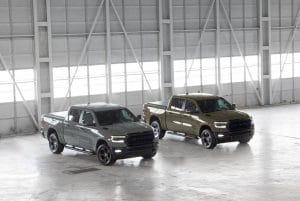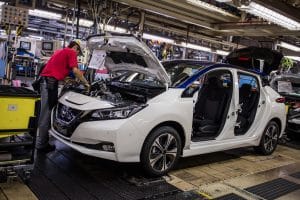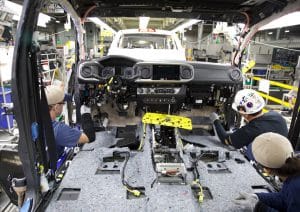
Nissan CEO Makoto Uchida is formulating a plan to bring the automaker back in the long term. In the near term, the company is cutting production by 30 percent.
With the worsening global pandemic again taking a toll on automotive sales, there are growing indications manufacturers are preparing to trim back production, Reuters today reporting Nissan Motor Co. will cut worldwide output 30% through December due to declining demand.
General Motors confirmed a report in TheDetroitBureau.com earlier this week that it is temporarily dropping a third shift at a light truck plant in Missouri due to weakening demand, and a senior Toyota official told us on Monday that the automaker is also considering production plans in the face of weakening U.S. sales.
Nissan will turn out just 2.6 million vehicles worldwide between April and December, down from the 3.7 million it produced during the same period last year, according to the Reuters report.
(Nissan’s $6.2B loss substantially larger than expected.)
“We cannot comment on speculation regarding our product plans,” a U.S. spokesperson said when asked about the Reuters report.
The cutback would come at a particularly tough time for Japan’s second-largest automaker. It reported a $6.2 billion loss for the fiscal year that ended March 31, its first annual deficit in 11 years. When the figures were announced in May, CEO Makoto Uchida cited “excess sales expansion” as a factor and promised to keep production more closely aligned with demand, “maintaining financial discipline and focusing on net revenue per unit to achieve profitability.”
Nissan plans to adjust output in quarterly stages, Reuters reported, citing unnamed sources. For the July-September period, production will be reduced by 47% worldwide, then slowly creep back up through December.
One of the challenges facing the industry is the fact that total production shutdowns forced by the pandemic earlier this year have resulted in significant inventory issues, though these vary by product segment and market region. Overall, there were about 1.1 million fewer vehicles in U.S. inventory than was normal for this time of year, analysts with Cox Automotive reported during a media webinar earlier this month.
The most severe shortages impact the full-size pickup segment and then, to a lesser degree, SUVs and other light trucks. And dealers are reported facing the biggest problems in Southern states, such as Texas and Florida, where sales held up better than the rest of the U.S. during the original COVID-19 surge in March through May.

Truck sales have been down, but not like other vehicles. However, shortages of certain trim levels have occurred.
Now, however, it’s that very region being hammered by a new surge in the pandemic. A new estimate by analysts suggests the auto industry could be headed for another soft patch as the surge of COVID-19 sweeps across the Sunbelt, where some of the largest markets for new cars are located.
(Nissan plans for restructuring call for $2.8B in cost cuts.)
“The surge in COVID-19 cases across the country is negatively impacting consumers and dealers. Almost half of the shoppers delaying their purchase described this as a ‘scary’ time to buy a vehicle,” Cox Autotive analysts said in their latest Consumer and Dealer Sentiment Study released this week.
Early indications are that the states being hardest hit by the new surge also are experiencing some of the sharpest dips in sales.
For the moment, Toyota is still struggling to rebuild inventories that dipped during the carmaker’s nearly two-month U.S. shutdown, Cynthia Tenhouse, U.S. vice president of marketing, said during a webinar, but she quickly added that, “We’re definitely concerned. The numbers are not going the right way … (and) we’re monitoring it closely.”
GM’s decision to drop the third shift at its Wenztville, Missouri truck plant will idle approximately 1,250 hourly workers. The facility produces the Chevrolet Colorado and GMC Canyon midsize pickups, as well as the Chevy Express and GMC Savana full-size vans. GM has not indicated how long the cuts will remain in effect.
Complicating matters for the industry, automakers and suppliers alike continue struggling to keep COVID-19 infections out of their plants. It’s become routine for workers to be identified with the disease, some before reporting to their posts, others while already on the line, necessitating temporary delays amidst cleansing operations.
Some of the biggest problems have occurred in Mexico and are creating serious shortages of critical components.
“Due to COVID-19, the State of Chihuahua in Mexico has limited employee attendance to 50%, a region in which we have several suppliers,” Kumar Galhotra, Ford president, Americas and International Markets Group, said in a statement this week.
(Nissan – finally – lifts the cover on the new Rogue.)
That is leading to a shortage of engines and other parts that, in turn, impact production rates at U.S. assembly plants, creating a situation, Galhotra said, “that is not sustainable.”


